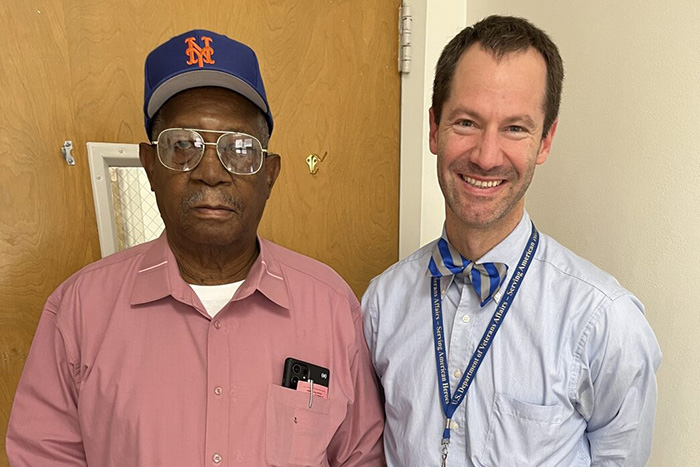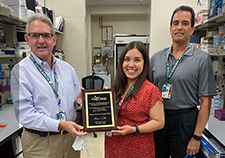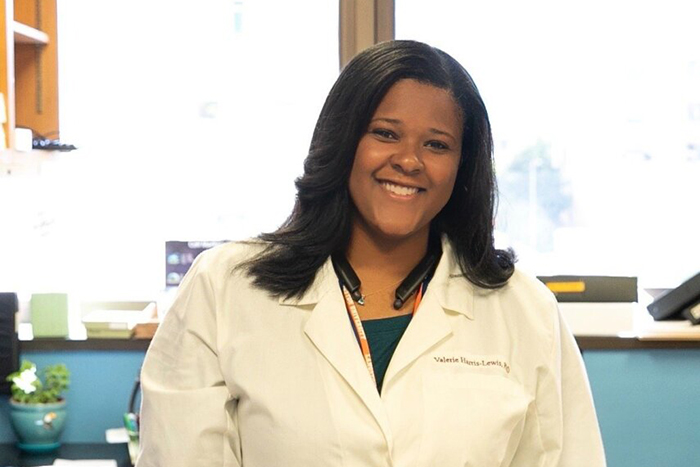Office of Research & Development |
 |


1SG (Ret.) James Perry and oncologist Dr. Martin Schoen at the St. Louis VA Medical Center in Missouri.
December 19, 2023
By Erica Sprey
VA Research Communications
"My hope for the future is to combine input from patients, physicians, and computers to find the best treatments to optimize care for Veterans."
“You have cancer,” is one of the most devastating things a person can hear from their doctor, but if any phrase is worse, it would have to be, “Your cancer is back.”
That’s the situation U.S. Army Veteran James Perry, who was first diagnosed with prostate cancer in 2001, found himself in; not once, but twice.
Perry’s prostate cancer was initially treated with radiation therapy, but it returned five years later. After three years of drug therapy, it looked like he’d beaten his cancer recurrence. Unfortunately 12-years after that, his prostate cancer returned again, and this time spread to his lung. The 78-year-old Veteran was running out of time.

VA researchers using AI to decide best treatment for rectal cancer

VA center training the next generation of researchers in blood clots and inflammation

AI to Maximize Treatment for Veterans with Head and Neck Cancer

VA investigator brings diversity into autoimmune disease research
The John J. Cochran Veterans Hospital in St. Louis, Missouri, sent a sample of Perry’s lung tumor to the lab for genetic testing, where they discovered he had a BRCA1 gene mutation. His medical oncologist, Dr. Martin Schoen, recommended Perry enroll in a clinical trial that was testing the effectiveness of a new class of drugs called PARP (poly ADP ribose polymerase) inhibitors to treat hormone-sensitive prostate cancer.
The AMPLITUDE clinical trial is investigating the addition of niraparib (a PARP inhibitor) to standard therapy for hormone-sensitive prostate cancer in patients with certain mutations in DNA repair genes, like BRCA1. If the genes that control DNA repair are mutated, the repair mechanism doesn’t work well, increasing the risk that cancer will develop during a person’s lifetime. However, the same mutation that causes a person to be at risk for cancer can be used to kill the cancer. Drugs that inhibit PARP proteins interfere with cell repair and cause cell death. Niraparib has been approved for treating ovarian cancer in patients with mutations in DNA repair genes and is being studied in hormone-sensitive prostate cancer.
Following a 20-year career in the service, Perry retired in 1985 as a first sergeant, but even 38 years later, tough command decisions still come easily to him. He said he had no reservations about enrolling in AMPLITUDE and would endorse it to others.
“Yes, I would highly recommend enrolling in a trial,” Perry said. “If a Veteran has that opportunity, I would encourage it - anything that is going to give you a few more days is worth it.”
One year after enrolling in the trial, Perry’s lung tumor can barely be seen on CT scans, and his prostate-specific antigen (PSA) levels are undetectable. He said he has enjoyed being part of the trial because he knows he is getting the most-advanced care possible and is proud to help others like himself.
Helping Veterans like Perry gain access to clinical trials is one of the main goals of VA’s Precision Oncology Program for Cancer of the Prostate (POPCaP), which was established in partnership with the Prostate Cancer Foundation (PCF) in 2016. The program also uses genetic testing to find the best possible treatments for Veterans with advanced prostate cancer.
POPCaP’s network extends across the U.S., from Boston to Houston to San Francisco. It includes 21 Precision Oncology Centers of Excellence, supplemented by regional centers, that provide cancer care to any Veteran who develops prostate cancer, no matter where he lives.
To that end, VA and the PCF have developed a number of collaborative goals:
“We are honored to support VA’s work to improve the lives of Veterans who are living with advanced prostate cancer,” said Rebecca Levine, Vice President and National Director of the PCF Veterans Health Initiative. “Clinical trials play a vital role in bringing new treatments to patients who need them most. Mr. Perry’s experience illustrates VA’s commitment to provide state-of-the-art cancer care to all Veterans who need it.”
The AMPLITUDE trial is a multinational clinical trial that is sponsored by Janssen. The study is being conducted at nearly 380 sites worldwide. Participating VA sites include Charleston, South Carolina; Durham, North Carolina; Los Angeles; Manhattan, New York; Philadelphia; Portland, Oregon; Puget Sound, Washington; and St. Louis.
“VA is working to improve care for all patients, but particularly for groups that traditionally do not have access to clinical trials and are not well-represented in clinical research,” said Schoen, who is also a Navy Veteran, data scientist, and assistant professor of medicine at St. Louis University. “Because Mr. Perry is African American, his participation in the AMPLITUDE trial indirectly benefits others by providing information about new treatments in a more diverse group of patients.”
AMPLITUDE is a double-blind study, so neither Perry nor his doctor knows if he is receiving the new drug combination or standard treatment. The Army Veteran comes in every four weeks for an exam, blood work, and to pick up the trial medicines, which are prepared by a research pharmacist. Perry also receives a CT scan every four months. He will continue in the trial until 2025, unless his team feels that he needs a different drug, or if he suffers an adverse event.
For the present, treatments “have been going very well for Mr. Perry,” said Schoen.
“My aim is to use data across the entire VA network to personalize treatment for Veterans with cancer, based on factors that we have available in our medical record system,” Schoen added. “My hope for the future is to combine input from patients, physicians, and computers to find the best recommendations for treatment in order to optimize care and prolong people’s lives.”
Prostate cancer is the most commonly diagnosed cancer in U.S. Veterans, accounting for nearly a third of new cases in VA. More than 9,220 Veterans with prostate cancer are treated at a POPCaP-genitourinary center of care. Of those individuals, roughly 2,400 have metastatic disease, with more than 50% receiving next generation sequencing.
VA Research Currents archives || Sign up for VA Research updates